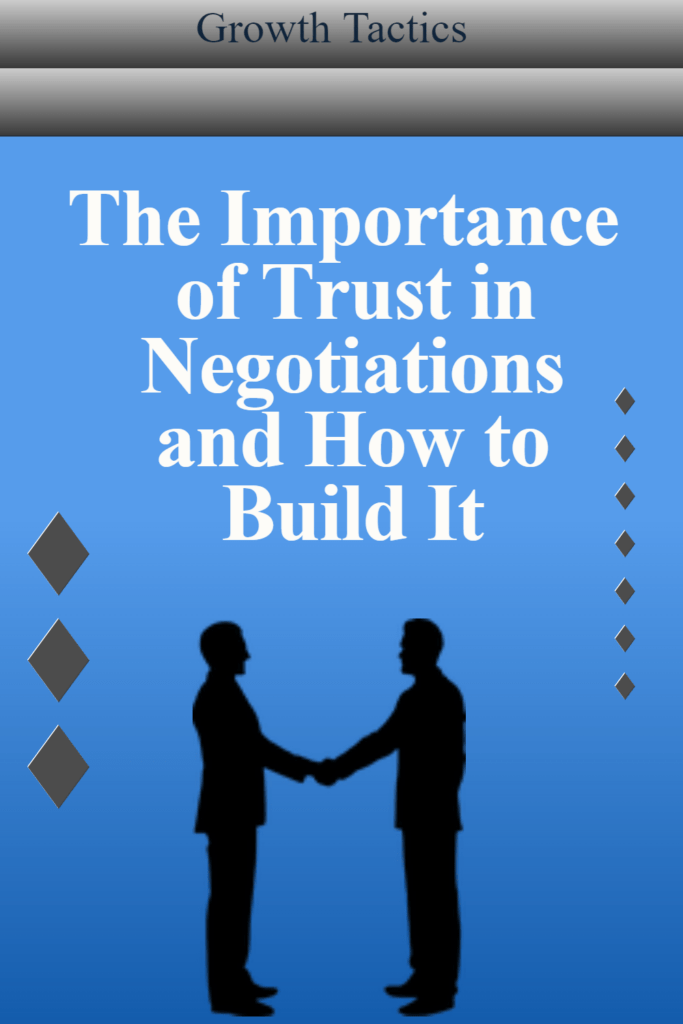Trust is the foundation of successful negotiations. Without trust between parties, reaching mutually beneficial agreements becomes exponentially more difficult.
What exactly is trust in the context of negotiations? Trust means each party believes the other is credible, reliable, and acting in good faith. Negotiators who trust each other can focus on crafting win-win deals instead of guarding against deception.
In this comprehensive guide, we will explore the importance of trust in negotiations. You’ll learn concrete strategies for building trust from the ground up, even with distrustful counterparts. We’ll also examine how factors like culture impact trust-building approaches.
By the end, you’ll understand why trust is the cornerstone of negotiations and how to establish it across the bargaining table. With trust, negotiators can find common ground, make concessions, and walk away satisfied with deals that create long-term value.
Jump To Section
Why is Trust Vital for Successful Negotiations?

Trust is a critical foundation for successful negotiations. When trust exists between the parties at the bargaining table, doors open for more effective communication and information sharing. Negotiators who trust each other feel comfortable being transparent about their interests and priorities. They can conversate candidly about what they hope to achieve in the negotiation and any constraints they face.
With sufficient trust, negotiators become willing to make themselves vulnerable by revealing confidential information or making concessions. They don’t fear that such moves will be exploited. Rather, the counterpart is expected to reciprocate in kind, leading to a mutually beneficial outcome.
Trust also enables negotiators to look beyond the current deal and consider possibilities for an ongoing business relationship. If both parties prove themselves trustworthy, that bodes well for partnerships on future projects and transactions. Essentially, trust builds goodwill between negotiators.
When negotiators distrust each other, the opposite dynamics come into play. Communication breaks down, information is withheld, compromises are avoided, and value-creating trade-offs are elusive. Lack of trust poisons the relationship.
How Does Trust Get Established in Negotiations?
Trust in negotiations often starts before the two parties even meet at the bargaining table. A negotiator’s reputation and track record for competence, integrity, and fairness precedes them. First impressions matter. If you have a history of negotiating ethically and delivering on your promises, your counterparts are more inclined to trust you from the outset.
Reciprocating cooperation and sharing valuable information are key trust-building behaviors in a negotiation. When negotiators realize potential mutual gains are available through working together, they establish trust more quickly. Making small concessions or compromises demonstrates a willingness to be flexible and find common ground. Parties who openly share important interests and priorities are signaling they can be trusted. Mutual disclosure promotes understanding and forms the basis for crafting mutually beneficial solutions.
Rapport gets built through active listening, responding thoughtfully to concerns and questions, and displaying positive body language like smiling and open gestures. Skilled negotiators focus intently on what the other side is saying, restating key points to show comprehension. They work hard to put counterparts at ease through friendly banter and expressing empathy for the other’s perspective. Building personal connections gradually strengthens trust between negotiators.
Trust Goes Both Ways in Negotiations

Trust is not a one-way street in negotiations. For a strong foundation of trust to develop, both parties need to work to build and earn each other’s trust over time.
Negotiators should start small by sharing bits of information to signal they are trustworthy partners. This could involve providing details about their background, credentials, or past deals relevant to the current negotiation. However, be careful not to overshare or reveal sensitive information prematurely.
It’s also key not to assume trust too quickly. Trust takes time to build through a gradual process of reciprocity and demonstrating competence. Jeanne Brett from the Kellogg School explains, “If I concede to you, I have to believe that you will reciprocate in some way, that the payoff will come back to me.”
Especially with a new negotiating partner, negotiators must balance building rapport with protecting their interests. Trust emerges gradually as the parties reciprocate cooperative actions over multiple interactions. Actions speak louder than words when establishing trustworthiness.
Distrust Undermines the Negotiation Process
When there is distrust between negotiators, the negotiation process suffers greatly. Parties become guarded and unwilling to cooperate when they do not trust their counterpart. This hinders the open information exchange and relationship building essential for a successful negotiation.
Distrust creates an unproductive zero-sum mindset where negotiators view the bargaining table as a win-lose scenario. They assume that any gain for the other side must come at their own expense. This adversarial perspective makes it difficult to identify mutually beneficial solutions.
With distrust, negotiators will likely not make concessions or explore creative options. They fear the other side will take advantage of any show of flexibility. Negotiators may employ manipulative tactics to gain leverage rather than have a sincere dialogue. The lack of good faith prevents parties from finding common ground.
Overall, distrust results in suboptimal negotiating behavior and outcomes. Parties miss opportunities to expand the pie and craft integrative agreements. A lack of trust becomes a self-fulfilling prophecy that encourages the very exploitation negotiators hoped to avoid. Building some basic trust is essential for productive negotiations.
How Can Negotiators Build Trust From Scratch?
When negotiating with an unfamiliar counterpart, there is no pre-existing trust to rely on. In these situations, negotiators actively build trust from the ground up. This takes time and strategic effort. Here are some of the most effective ways to foster trust with a new negotiating partner:
- Research counterpart’s reputation in advance – Learn about their background, character, past negotiating behavior, and typical bargaining style. This provides initial insight into their trustworthiness before you ever interact. Reputation gives clues about their competence, integrity, and tendencies.
- Have an initial informal meeting to establish rapport – Meet in a friendly context separate from formal negotiations to establish a personal connection. Discuss hobbies, interests, or other topics unrelated to the deal. This starts creating comfort and familiarity.
- Frame negotiation around common interests and shared goals – Emphasize alignment in certain areas rather than focusing on conflicting priorities. Frame the negotiation as cooperative problem-solving between partners rather than adversarial bargaining between opponents. This encourages a collaborative mindset.
When negotiators enter discussions with openness, transparency, and good faith, trust can develop between parties who have never worked together. A relationship grounded in trust leads to better long-term deals.
Active Listening Shows You Can Be Trusted

Active listening is one of the most effective ways to build trust in a negotiation. This involves giving your full attention to your counterpart and genuinely understanding their perspective.
Active listening displays that you have a sincere interest in what the other negotiator is saying. You are seeking to comprehend their needs, interests, and constraints. This builds empathy and humanizes the interaction, helping establish rapport and trust between you.
When your counterpart feels truly heard and understood, they are more likely to listen to you. They can see you are making an effort to cooperate and find common ground. This reciprocal dynamic is key for building the foundation of trust necessary for integrative negotiations and win-win outcomes.
So pay close attention when your negotiating partner is speaking. Clarify any points you don’t follow. Reflect what you heard in your own words. Ask thoughtful questions to learn more. These active listening techniques demonstrate you are trustworthy and ready to engage in a constructive negotiation built on understanding.
Small Concessions Signal Willingness to Cooperate
When negotiating with someone you don’t yet trust, making small unilateral concessions can help get the ball rolling toward cooperation. Taking the first step offering something without asking for anything immediate signals to your counterpart that you are willing to collaborate.
This display of goodwill is often reciprocated, as people tend to mirror the level of cooperation they receive from the other party. When your negotiating partner sees you make a concession, they become more likely to respond in kind. Each side slowly begins making compromises back and forth.
However, it’s important not to give too much away early in this trust-building process. Small incremental concessions are better than large sweeping ones at the start. You want to reciprocate proportionally to what you receive from the other party. Making sacrifices that are too big too soon could be seen as foolish rather than cooperative.
The key is making an initial concession significant enough to get things moving, but not something that undermines your negotiating position. This balance demonstrates you are willing to collaborate, but expect appropriate cooperation in return.
How Culture Influences Trust-Building Approaches
Different cultures take different approaches to building trust in negotiations. Collectivist cultures like those in Asia and South America rely more heavily on establishing personal relationships and rapport with their counterparts. Building trust is based on the strength of the relationship rather than any explicit proof of competence.
On the other hand, individualistic cultures like the United States and Northern Europe rely more on direct evidence of competence, skills, and reputation when deciding whether to trust a negotiating partner. Trust is built through tangible demonstrations of ability.
Experienced negotiators know they must adjust their trust-building style to fit the cultural background of their counterparts. When dealing with someone from a collectivist culture, establish a personal connection through informal conversation. Get to know them as an individual before jumping into business matters.
With partners from an individualistic culture, arrive fully prepared to prove your expertise and abilities in the negotiation domain. Bring case studies, testimonials and evidence of deals successfully closed to demonstrate you are worthy of their trust.
Understanding these cultural differences allows negotiators to establish trust more effectively across the table. Building trust in a way your counterpart is comfortable with shows respect and gets the relationship off on the right foot.
Conclusion: Trust is the Foundation of Win-Win Deals
Trust is critical for successful negotiations that create value for all parties involved. As we’ve explored, trust facilitates open communication, information sharing, and good-faith concessions between negotiators. When trust is present, negotiators can focus on interests over positions, collaborate to solve shared problems, and seek integrative solutions that satisfy the needs of both sides.
Without trust, negotiations typically become adversarial, zero-sum contests where parties make minimal concessions, hide information, and undermine the other side. Distrust creates a competitive mindset focused on claiming value rather than jointly creating it. As a result, negotiations fail to reach efficient agreements that maximize the potential gains for both parties.
By building rapport, demonstrating credibility, making reciprocal concessions, and employing other trust-building techniques, negotiators can foster the mutual understanding and goodwill necessary for integrative bargaining. When negotiators trust each other, they can talk about their interests, invent creative solutions, and make trades across issues to achieve win-win outcomes.
In future posts, we’ll explore advanced negotiation strategies and tactics to help negotiators create more value at the bargaining table. You’ll be equipped to negotiate win-win deals that benefit all parties with the proper skills and an understanding of trust.


